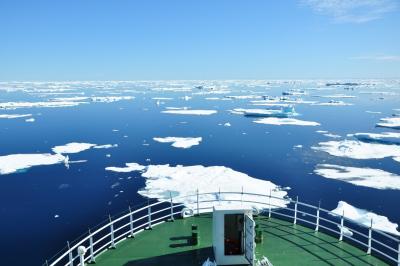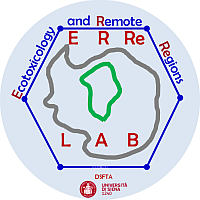

The research group in Ecotoxicology and Remote Regions (ERRe Lab) has been studying contamination in Antarctica since 1990 and in the Arctic since 2000. In recent years, research topics related to contaminants in the Polar Regions have been studied in the context of climate change, to assess how they affect distribution, accumulation and temporal trends of contaminants.
Understanding the sources, flows, distribution, and fate of persistent organic pollutants (POPs) is critically important for evaluating solutions to contamination problems.
ERRe Lab studies legacy and emergent/new POPs included in the Stockholm Convention (chm.pops.int/).

The research projects developed by ERRe Lab are usually aimed at studying the bioaccumulation in predators (fish such as sharks, tuna, swordfish; reptiles such as turtles; birds including penguins, marine mammals) and their trophic webs, the transfer of contaminants in abiotic and biotic compartments of the ecosystem, in the context of climate change.
The research projects developed by ERRe Lab are usually aimed at studying the bioaccumulation in predators (fish such as sharks, tuna, swordfish; reptiles such as turtles; birds including penguins, marine mammals) and their trophic webs, the transfer of contaminants in abiotic and biotic compartments of the ecosystem, in the context of climate change.
ERRe Lab has possibly adopted non-destructive/non-lethal sampling methods, being involved in the study of endangered species or living in fragile and/or protected areas.
Some research topics include:
- POP identification and quantification, organotropism, trend of accumulation from tissue to population/species level
- POP transfer between abiotic (air, water, sediments) and biotic (food webs) compartments and between trophic levels; bioaccumulation and biomagnification and related factors
- risk assessment (TEF - TEQ method) in marine food webs, including through the use of sentinel organisms and bioindicators, for risk assessment
- risk assessment for humans due to contaminant ingestion (Acceptable Weekly Intake – TWI – and Estimated Daily Ingestion – EDI) in the case of commercial species (e.g. fish) and other food items.

A distinctive aspect of ERRe Lab in the study of contamination is the ecological/biological approach, always used in the interpretation of data.
Over the years, ERRe Lab has promoted the exchange of teachers and students to and from universities in other countries also as part of European exchange programs to cultivate collaborations, to carry out projects, to support training activity. Exchange activities may include laboratory, field experiences, seminar activity.